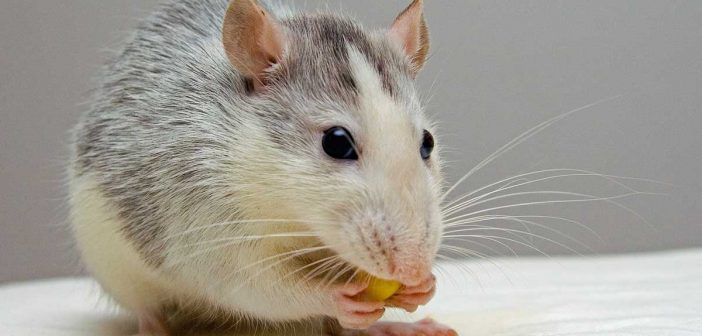by A. C. Thompson
Many people get their first look at a domestic rat in their local pet store, stopping by to purchase treats or toys for their other pets. These intelligent, cuddly little guys are irresistible, and soon enough, an innocent bystander will be looking to take one home. What people don’t know is the horrible cycle that most pet stores put their rodents through.
Pet stores get their rats in three main ways. The first is purchasing from rat mills and back yard breeders. Rat mills are a lot like puppy mills; the rats are kept in squalid conditions, have no human interaction, and are bred continuously from a young age. Many of them get sick and die. Just like with a back yard breeder, a rat mill has no thought for the future of its specimens and so will breed rats with poor genetics, leading to an excess of health and behavioral issues. It’s simply a money-making venture.
The second way a pet store acquires new rats is from accidental litters – and most times, the litters come from the pet store selling a pregnant female or a male-female pair to an unsuspecting customer. As rats can get pregnant as young as 7 weeks, give birth to 20+ babies at a time, and become pregnant immediately after delivering, the problem can quickly get out of hand, even for an experienced owner.
Pet stores will also breed their own rats. They try for color, pattern, coat, and ear type, but they have no concern for health. If the tank full of pretty young rats isn’t empty by the time they hit three months, those (much too young) pups are going in the breeder tank.
Overall, getting your new little friends from the pet store is a bad idea. It lets the store keep breeding and buying more unhealthy rats, allowing the business to continue indefinitely. The rats you buy will be riddled with problems, from diabetes and cancer to bad biting habits.
Instead, find a reputable breeder or go to your local animal shelter. Good breeders take into account their rats’ genetics, looking to better the species and avoid serious illnesses and temperamental issues. Rats from breeders live longer, are happier, and bond better than pet store rats. If you are set on rescuing, the shelter is the answer for you. Though some of these may be well-bred rats, most come from owners who bought them from pet stores. This way, you’ll be saving pet-mill rats without furthering the business. Make the responsible decision – adopt a rat.

A. C. Thompson is an avid reader and writer as well as an animal enthusiast. She has been rescuing rodents for years, along with the occasional stray cat. She lives with her boyfriend, twenty-seven rats, and their feline friends Pharaoh and Eloise.





6 Comments
I have never thought of having a rat as a pet but considering some of its qualities.. like they easily bond to their human companion. I think it might be a good idea.
Rats make fantastic pets, everyone thinks they are dirty but they aren’t. They are little characters too, i love them!
…………….Pet Rats……..There are upwards of 500..different types of so-called rats but because they do not all belong to..the Rattus family they are not all considered to be true rats. The minimum..amount of time is an hour a day but some rats need much more free time than that.
Thank you very much for that marvelous article
Hmmmmm I think Ill stick with my dogs LOL, Thx for the article. Cathe
Don’t forget the humble mouse! My kids all have mice!